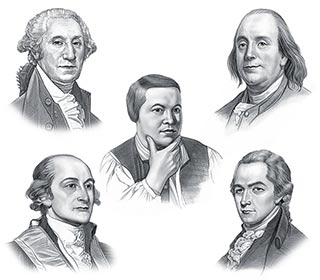Life and Living Conditions of the Mayflower Voyage
There were a total of 102 passengers on the Mayflower Voyage. They consisted of men, women and children from different walks of life. They undertook the 66 day journey on the ship looking for a better life than they were living in England. These facts provide a glimpse at the living conditions endured by the men women and children who undertook the voyage of the Mayflower ship to America.
Fact 1: The Mayflower was the name of the sailing ship that took the people, who would become known collectively as the 'Pilgrims', to the New World
Fact 2: The colonists had been granted territory in Virginia, but the ship landed at Plymouth Settlement, Massachusetts, on December 26, 1620
Fact 3: Two people died on the voyage to America
Fact 4: One person was born on the voyage to America
Fact 5: There were 102 voyagers on the Mayflower Ship. Only 41 of them were Separatists, aka Puritans and Pilgrims. The other voyagers were tradesmen, craftsmen, laborers and Indentured servants and several young orphans
Fact 6: The voyages were split into two groups - the Separatists and the rest of the passengers. Each group referred to the other as either "Saints" (the Separatists) or the "Strangers"
Fact 7: The "Saints" particularly annoyed the crew and the "Strangers" by being sanctimonious. The "strangers" antagonized the saints with their intolerance of the beliefs of the "Saints"
Fact 8: The saints imposed a minority rule and created dissension by insisting that their religious practices be followed by all of the passengers and the crew.
Fact 9: The Puritan men and women who travelled on the ship were dissenters from the Church of England who wanted to create a new church in the colonies.
Fact 10: With nearly 130 people on board, including the crew, the living conditions were very difficult. Each family was allotted a very confined amount of space for personal belongings
Fact 11: Some of the families built smaller "cabins," using simple wooden dividers to provide a small amount of privacy
Fact 12: The first half of the voyage went fairly smoothly, the only major problem was sea-sickness
Fact 13: The second half of the voyage was terrible. They encountered a number of Atlantic storms, very rough seas and were nearly shipwrecked
Fact 14: The immigrants took some live animals on the journey including dogs, sheep, goats and poultry. The animals were kept in pens on the main decks
Fact 15: There were 30 children on board - 11 girls and 19 boys
Fact 16: There were between 25 - 30 crew members
Fact 17: The voyage on the sailing ship took 66 days
Fact 18: The "Saints" and the "Strangers" realised that if they did not work together they could all die in the wilderness - they agreed to make a pact which became known as the Mayflower Compact
Fact 19: The voyagers mostly slept and lived in thin walled cabins with low-ceilings. Any person over five feet tall would not be able to stand up straight
Fact 20: Food rations were issued daily and food was cooked for a group at a time
Fact 21: The crew had their own cook and a small kitchen on the top deck
Fact 22: Food was cooked by the firebox, which was an iron tray with sand in it on which a fire was built
Fact 23: The cargo of food, tools, and supplies during the voyage were kept in the cargo hold on the lower deck. Barrels were used for storage and contained flour, biscuits, dried meats and vegetables. Other barrels contained water and beer
Fact 24: Many of the voyagers suffered from scurvy and other diseases
Fact 25: There was no water for washing clothes - the voyagers had to wear the same clothes throughout the voyage. Their clothes became dirty and were often ripped but there was nothing they could do until they reached the New World
Fact 26: The voyagers drank beer and wine. Beer was thought to be safer to drink than water
Fact 27: Some passengers brought family pets such as cats, dogs and birds
Fact 28: The roles of the crew on the Mayflower included the pilot, a carpenter, a cooper (barrel maker), a bosun, a gunner, a cook, quartermasters, and the ship’s merchant (purser)
Fact 29: The crew had their own sleeping quarters and slept in shifts
Fact 30: There were 6 cannon on the ship - the passengers were concerned that they might be attacked by French or Spanish vessels. They also required defence from possible attacks from pirates and Native Indians.
Fact 31: The passengers spent most of their time, below decks in their cabins. The cabins had no sunlight and were dark, cold and damp
Fact 32: When the weather was good they went on the top deck, bad weather and rough seas could result in people being thrown overboard
Fact 33: There were no toilets on the ship - Wooden “chamber pot” buckets were used as toilets
Fact 34: Daily meals consisted of Salt fish, hard tack, salt beef, and cheese
Fact 35: Life on board the ship was not pleasant. It was monotonous, cramped and boring. Many suffered with seasickness throughout the whole voyage.
Fact 36: Time was spent by the men in planning their future lives, talking, taking light exercise when the weather allowed and playing board games such as chess
Fact 37: Much of their time was taken up praying and singing. Sunday services lasted all day
Fact 38: The women prepared the food, cooked and looked after the children
Fact 39: The children were bored - unable to play on deck because of the weather, they had to amuse themselves below deck
Fact 40: The passengers arrived at their destination in November of 1620 when the ship landed at Plymouth Bay.
